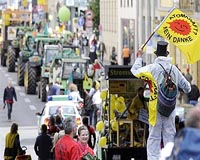 |
Buyukeceli, Turkey (AFP) March 21, 2011 Amid global alarm over the nuclear crisis in Japan, Turkey -- which is also quake-prone -- is going ahead with plans to build its first nuclear plant. "Here is a small corner of paradise. We do not want their nuclear plant," said Yuksel Sahin from a hilltop, pointing to the end of the narrow valley of Akkuyu in the southern province of Mersin near the Mediterranean. Turkey tried for nearly four decades to build a nuclear plant here. But the plans were repeatedly thwarted due to opposition from neighbouring countries, a challenge from environmentalists as well as a cash crunch. Sahin pointed at the sunken ruins of his village where he grew up. Its inhabitants have long been expelled due to the nuclear plans. Among some unused barracks for the future workers of the plant and concrete blocks, only a brand new pier stands as proof that the site was not abandoned. Plans for the long-stalled power project finally took off in May 2010 with the construction entrusted to Russia. Turkish Prime Minister Recep Tayyip Erdogan recently repeated his determination to implement the project just before leaving for a trip to Moscow. "We cannot abandon the joint projects due to earthquakes," said Erdogan, who also said the previous day that the work for the plant could begin within weeks. Akkuyu would be "an example for the rest of the world", he said. In Buyukeceli, the village closest to Akkuyu, where the former inhabitants of the small valley currently live, the appearance of the first Russian technicians early this month sowed fears. "If the Japanese could not (ensure the safety of nuclear power), do you believe that the Russians are going to do it?" an old farmer asked, sitting in the main village cafe. "Now, Japan is a threat to the world. Two reactors exploded and the world is in danger. And meanwhile, the Russians will build a plant in Akkuyu," said the man, sporting a wizened sunburnt face. At a nearby table, a domino player added: "Here too, the same thing will happen. There is no difference" with Japan, he predicted, noting that the region is part of a seismic zone. More than 140 people died in a 1998 earthquake that struck Adana, only 250 kilometers east of Akkuyu. Pinar Aksogan, an activist from Greenpeace Mediterranean, said the area was a high-risk zone. "The license to build a nuclear in Akkuyu was awarded in 1973. At that time it was estimated that there was no seismic danger there. But in 1999 it became clear that there is a fault zone within 25 kilometers of Akkuyu," she said. For Ozeren Sinan, a seismologist at Istanbul Technical University, the main danger lies rather in the possibility of a tsunami that might be created by the extensive overlap of tectonic plates in the south of Crete and Cyprus. "If an earthquake occurs... in the overlapping area, it can cause a large tsunami in the Aegean Sea and throughout the Eastern Mediterranean basin," he said.
Share This Article With Planet Earth
Related Links Nuclear Power News - Nuclear Science, Nuclear Technology Powering The World in the 21st Century at Energy-Daily.com
 Nuclear wake-up for Merkel in state vote
Nuclear wake-up for Merkel in state voteBerlin (AFP) March 20, 2011 Voters handed German Chancellor Angela Merkel a wake-up call Sunday on nuclear power after the Japan crisis as the Greens more than doubled their score in the second of 2011's seven state elections. The result will give the ecologist party high hopes for a much bigger prize: success in an election next Sunday in the wealthy southwestern state of Baden-Wuerttemberg, the most important of the ... read more |
|
| The content herein, unless otherwise known to be public domain, are Copyright 1995-2010 - SpaceDaily. AFP and UPI Wire Stories are copyright Agence France-Presse and United Press International. ESA Portal Reports are copyright European Space Agency. All NASA sourced material is public domain. Additional copyrights may apply in whole or part to other bona fide parties. Advertising does not imply endorsement,agreement or approval of any opinions, statements or information provided by SpaceDaily on any Web page published or hosted by SpaceDaily. Privacy Statement |